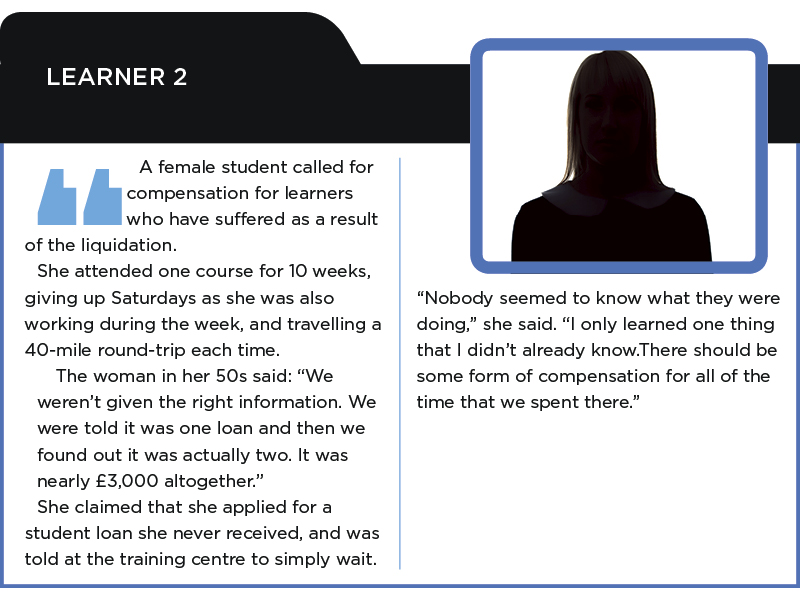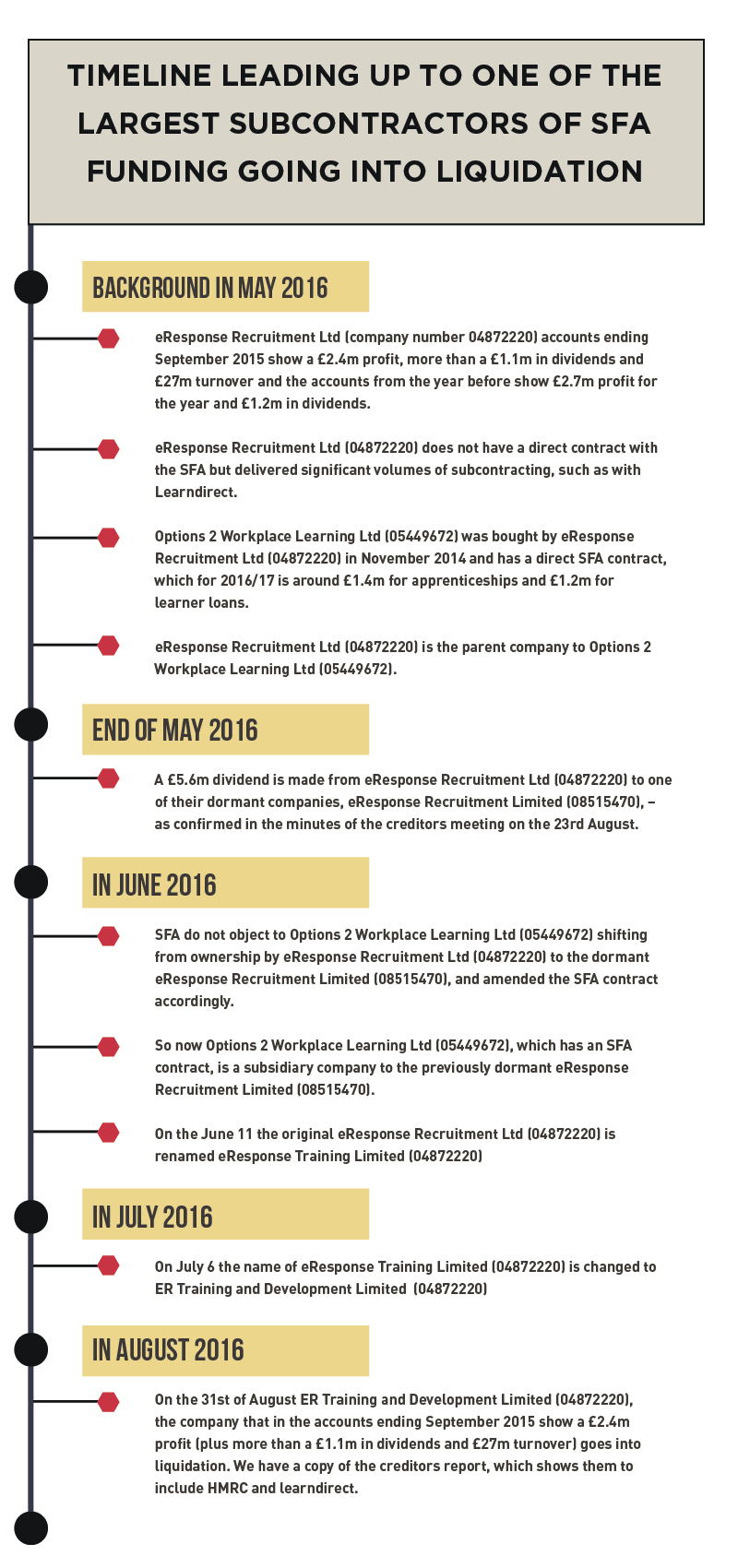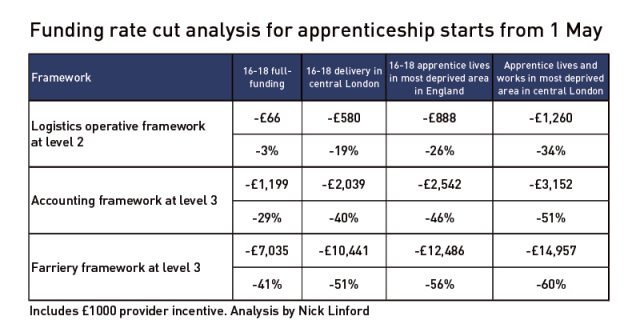Serious questions are being asked of the Skills Funding Agency, after it allowed directors to switch the ownership of a successful provider they ran from one parent company to another, before transferring out a large amount of money, liquidating it, and leaving learners and creditors on the hook for millions of pounds.
After a month-long investigation by FE Week, the SFA has finally agreed to look into the complex web of companies owned by Paul Alekna (pictured), who ran one of the UK’s largest training subcontractors until he liquidated it in August.
The SFA originally declined to object to an ownership change for the Worcestershire-based provider Options 2 Workplace Learning Ltd, to which it had allocated around £2m for apprenticeships and advanced learning loans during the last academic year. Ownership was switched from one parent company – called eResponse Training Ltd – to another – eResponse Recruitment Ltd, which was dormant at the time. All of these companies were owned by Mr Alekna, with his brother Joe as managing director.

However, eResponse Training Ltd, since renamed to ER Training and Development Ltd, went bust in August, leaving learners in limbo and creditors desperate to recover more than £3m debts – but not before assets worth £5.6m were moved to a new company that’s still trading and providing government-funded training.
The SFA took more than a week to respond to FE Week’s initial enquiries, and then insisted that it would not be investigating. However, pressed two weeks later to look again at the findings of our investigation, a spokesperson said on Tuesday (September 27): “We are aware of the issues raised in relation to Options Workplace Training and are following our published procedures.”
This is civil service-speak that effectively confirms they are following a path to a formal investigation.
There is a lot of public money involved and individuals have lost a lot too
The original parent company, now called ER Training and Development Ltd, went into liquidation on August 31. It was previously named eResponse Training Ltd for less than a month in July, and before that, eResponse Recruitment Ltd.
Its most recent accounts, ending September 2015, show a healthy business, with £2.4m profit, £1.1m taken in dividends, and a turnover of £27m. The accounts from the year before, lodged with Companies House, similarly show a £2.7m profit for the year and £1.2m in dividends.
When the original parent company went into liquidation, learners were left unable to complete courses, and a range of creditors faced a total shortfall of more than £3m.
But Mr Alekna, who sits on the Worcestershire local enterprise partnership business board, continues to run Options 2 Workplace and a new parent company – which to add to the confusion retains the eResponse name. Its website offering recruitment, training, skills and development services.
One of the declared creditors, who did not wish to be named, told FE Week: “We feel angry about this as there is a lot of public money involved and individuals have lost a lot too.
“We have worked with eResponse for many years but following their actions we hope it will be investigated by the authorities, as at present they could do the same thing again. I don’t want to see it happening again to anyone else.”
We have worked with eResponse for many years but following their actions we hope it will be investigated by the authorities
FE Week asked Mr Alekna about the transfer of £5.6m before the company went into liquidation.
An eResponse Group spokesperson said: “The £5.6m dividend is not a dividend of cash. No money passed to eResponse Ltd. There was a long-planned and legitimate separation of the training and recruitment businesses, which included the transfer of its recruitment activity to the Newco.”
He added this was part of a restructuring process that had been going on for more than a year.
The demise of ER Training and Development Ltd was, he claimed, down to “bad debts, the loss of ESF contracts, and a reduction in classroom subcontracting”.
Mr Alekna at first told FE Week that “no learners associated with eResponse Training have been disadvantaged and learning will continue through to completion with the support of our resources within Options 2”.
However, a number of students claimed that, following the cancellation of their courses, they had been left with advanced learner loans to pay off, but had not been offered alternative provision.
“We’ve run a report and can confirm all learners’ (loans) have been cancelled apart from those who have completed the course,” insisted Mr Alekna.
The Students Loans Company declined to comment on the situation with the students’ loans.
COMPANY STATEMENT
An eResponse Group spokesperson said: “During the last 12 months we have suffered a series of bad debts, the loss of ESF contracts, and a reduction in classroom subcontracting, down from £4.5m 2014/15 to £500,000 in 2015/16.
“We acquired the services of an in-house bid writer early in 2016 to help source new funding and bid on future ESF contracts.
“The restructure was completed in May 2016 following the required tax clearances from HMRC and confirmation from our accountants.
“During July we then suffered an additional loss of £800,000 with Pera Training confirming they are to pay back 1.3p in the pound.
“Our largest creditor could not provide extended credit terms and so the business was regrettably put into voluntary liquidation.
“This is the reason for the closure of the business.”
He insisted that “no one actually got a penny” of the £5.6m transfer, as “it was an approved accounting exercise”.
With regards to the restructuring process, he said: “The board of directors have been working with professional auditors, accountants and our legal team on restructuring the business – essentially to separate its recruitment and training operations.
“Taking advice, it was deemed simpler to move out the recruitment business as the existing business boasted the accreditations with delivering training services.”
IMPACT ON THEIR LEARNERS
Paul Alekna told FE Week that no learners associated with eResponse Training (which became ER Training and Development Ltd) had “been disadvantaged”.
A number of learners, who have asked to remain anonymous, disagree, claiming that their lives have been blighted by having their courses cancelled when the firm went into liquidation.





Since FE Week published the above article, eResponse have issued this statement.







